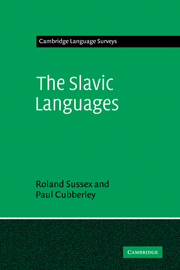Book contents
- Frontmatter
- Contents
- Preface
- Acknowledgments
- map
- 0 Introduction
- 1 Linguistic evolution, genetic affiliation and classification
- 2 Socio-historical evolution
- 3 Phonology
- 4 Morphophonology
- 5 Morphology: inflexion
- 6 Syntactic categories and morphosyntax
- 7 Sentence structure
- 8 Word formation
- 9 Lexis
- 10 Dialects
- 11 Sociolinguistic issues
- Appendix A: Abbreviations
- Appendix B: Orthography and transliteration
- Appendix C: Slavic linguistics: resources
- Bibliography
- Index
3 - Phonology
Published online by Cambridge University Press: 22 September 2009
- Frontmatter
- Contents
- Preface
- Acknowledgments
- map
- 0 Introduction
- 1 Linguistic evolution, genetic affiliation and classification
- 2 Socio-historical evolution
- 3 Phonology
- 4 Morphophonology
- 5 Morphology: inflexion
- 6 Syntactic categories and morphosyntax
- 7 Sentence structure
- 8 Word formation
- 9 Lexis
- 10 Dialects
- 11 Sociolinguistic issues
- Appendix A: Abbreviations
- Appendix B: Orthography and transliteration
- Appendix C: Slavic linguistics: resources
- Bibliography
- Index
Summary
Introduction
This chapter begins by examining the equivalences for vowels, consonants, groups of sounds and suprasegmentals with reference to Proto-Slavic (3.2). We then discuss the systems of vowels (3.3), consonants (3.4) and suprasegmentals (3.5) of the modern languages. For conventions of transcription and transliteration, see appendix B.
Historical evolution and modern equivalences
The first problem in studying the sounds of modern Slavic is one of equivalence: which sound corresponds to which other sound or sounds in the eleven languages? Some sounds show wide variations, like the root vowel in the word for ‘white’:
(1) B/C/S bȅo, Rus bélyj, Pol biały, Cz bílý, Slk biely, Blg bjal
But not all Russian words with e correspond to Slovak words in ie, Polish words in ia, Bulgarian words in ja or Czech words in í, cf. the word for ‘day’:
(2) Rus den′, Blg, Cz, Slk den, Pol dzień, B/C/S dȃn
We therefore need a common basis for comparison of equivalent or cognate sounds and their typological description.
We shall use Proto-Slavic as the reference-point. It is neutral with respect to all the other Slavic languages. Using it in this way is linguistically informative, since many of the sound changes which have formed the modern Slavic languages, like palatalization and assimilation, are still living as phonological and morphological processes in the modern languages. And the equivalences for a sound in any language can be recovered by checking in the various equivalence tables in which it occurs.
- Type
- Chapter
- Information
- The Slavic Languages , pp. 110 - 191Publisher: Cambridge University PressPrint publication year: 2006

